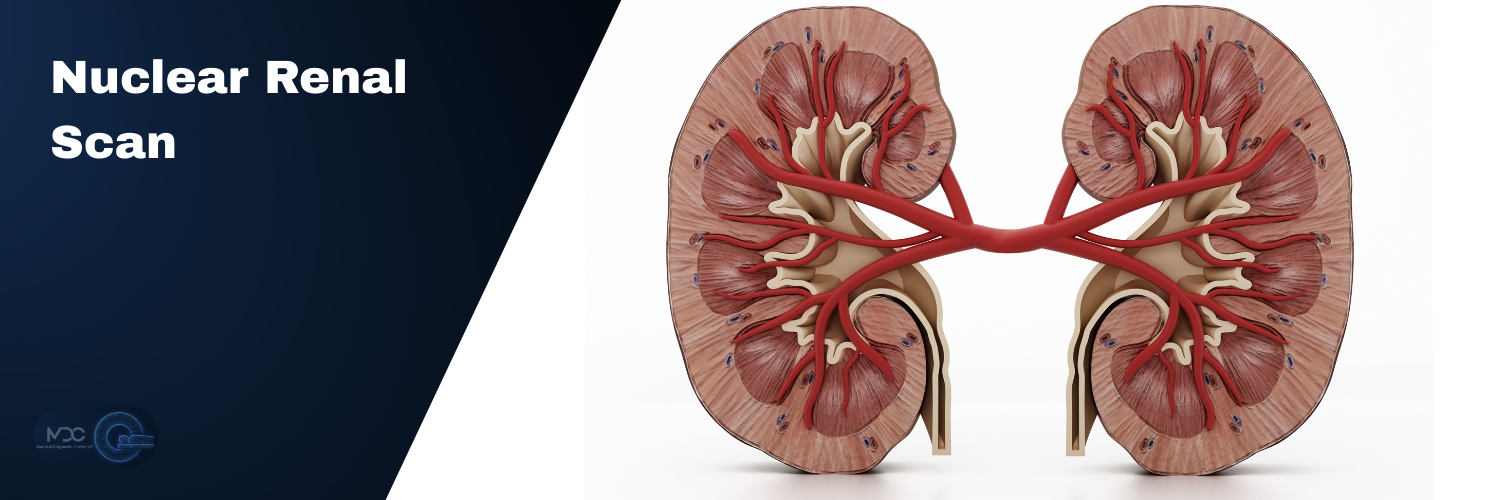What is a Nuclear Renal Scan?
A Nuclear Renal Scan is an advanced imaging test that helps assess your kidney function, blood flow, and urine drainage. It uses a small amount of radioactive tracer to track kidney activity, helping doctors identify blockages, infections, or other kidney issues.
Why Would I Need a Nuclear Renal Scan?
Your doctor might recommend this test for:
- Detecting blockages like kidney stones or blocked ureters
- Assessing kidney function, especially before or after a transplant
- Diagnosing renal artery stenosis (narrowing of the arteries, reducing blood flow to kidneys)
- Evaluating congenital kidney issues (particularly in infants and children)
- Monitoring recovery after kidney surgery
Types of Nuclear Renal Scans
DTPA Scan
- Measures glomerular filtration rate (GFR)
- Evaluates kidney blood flow and urine drainage
MAG3 Scan
- More sensitive for obstructed kidneys
- Suitable for patients with poor kidney function
DMSA Scan
- Detects kidney scarring or damage (such as from infections)
- Identifies pyelonephritis (kidney infection)
How Does It Work?
- Tracer Injection – A small radioactive tracer is injected into your vein.
- Imaging – A camera tracks the tracer as it moves through your kidneys.
- Functional Analysis – Doctors assess:
- Blood flow to kidneys
- Filtration & urine drainage
- Differences in function between the two kidneys
What Should I Do Before the Test?
- Hydrate well before your scan to improve image quality
- No fasting required – you can eat and drink normally
- Inform your doctor if you are:
- Pregnant or breastfeeding
- Allergic to any substances
- Taking any blood pressure medication (it may need adjusting)
What to Expect During the Procedure
- Total Time: 1 to 2 hours (depending on the type of scan)
- Scan Time: 30 to 45 minutes (you’ll need to lie still during the scan)
- Pain Level: Minimal (only an IV injection)
- Results: Available in 24 to 48 hours
After the Scan
- Drink plenty of water to help flush the tracer from your body
- No radiation risks – the tracer decays quickly and leaves your body within 24 hours
- Resume normal activities right away
- Follow up with your doctor for the next steps
Why Choose a Nuclear Renal Scan?
- More accurate than ultrasound or X-rays – It shows functional issues, not just structural ones.
- Early detection of kidney disease – Helps find problems before they become severe.
- Safe & non-invasive – Uses low levels of radiation (less than a CT scan).
- Guides treatment decisions – Helps doctors plan surgery, prescribe medications, or decide on other treatments.
Who Should Get This Test?
- Patients with unexplained kidney pain
- Individuals with recurrent urinary tract infections (UTIs) or kidney infections
- Pre-transplant evaluations for both donors and recipients
- Those with high blood pressure related to kidney issues
Book your Nuclear Renal Scan today for a precise assessment of your kidney health!
Consult our expert nuclear medicine team for detailed and accurate diagnostics.
Note: The radioactive tracer used is safe and leaves your body within 24 hours. There is no need for hospitalization after the test.
